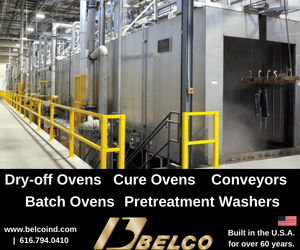Reliant Expands Effort to Make Equipment Delivery More Environmentally Friendly
Reliant’s updated environmental program, however, includes changes based on new information about how packaging, shipping, delivering and unpacking its products impact both customer satisfaction and the environment.

Reliant Finishing Systems (Morgan County, Ala.), a manufacturer of large-scale industrial painting, powder coating, and thermal processing equipment, has refined its crating practices to expand on its Green Aware Initiative, launched nine years ago. Reliant’s original program focused on crating its equipment with less lumber by replacing it with recyclable scrap material. The updated program, however, includes changes based on new information about how packaging, shipping, delivering and unpacking its products impact both customer satisfaction and the environment.
Under the direction of Reliant CEO Bart Roegner, the company re-examined its packaging material’s complete life cycle. It also evaluated how purchasers chose to off-load, store, uncrate, and then install its equipment. This research led to numerous beneficial changes.
Mr. Roegner says, “We examined behaviors that were consistent between both our clients and our installation technicians. Wooden crates and pallets were typically discarded as soon as our products were uncrated. This often required the time-consuming task of dismantling large crates. We replaced a portion of the lumber used in the crates with sheet metal scrap. Many of our clients were set up to recycle metal scrap, so they sold the steel crating material to recyclers instead of discarding it like lumber scrap. By refining our crates’ design, we were able to make them faster and easier to break down. These changes also reduced the total weight of typical loads. Approximately four to five hundred pounds of crating lumber per load was eliminated as a result of the original initiative. That savings is now even greater thanks to recent refinements.”
Over time, Reliant Finishing Systems developed methods to more densely pack flat parts, such as wall panels for paint booths and curing ovens, in a vertical configuration. This further reduced the use of wooden crating materials, eliminated the need for plywood lids and decreased shipping costs for large parts and assemblies.
As larger components are crated, they are identified by pallet wrap of various colors. This helps workers quickly differentiate crated components from one another at a distance. A new labeling protocol was developed to enable customers and installation technicians to uncrate orders more efficiently, reducing manpower requirements and minimizing forklift operation.
Some components have been packed by vendors on smaller pallets, reducing shipping weights and enabling these parts to be more densely packed into trailers when ordered in bulk, reducing the environmental impact of delivery. Small wooden crates have been replaced with durable plastic storage bins, which customers continue to use after the equipment has been installed.
Another change has been in the way large, complex orders are cataloged as they are prepared for shipping. An album of photographs and videos is created to document the location of both large and small parts, as well as record the location of the crates as they are loaded onto flatbed trailers and tarped for transport. This helps customers and installation technicians more effectively off-load equipment and stage it for assembly with minimal forklift operation.
Aaron Anderson, customer service manager for Reliant Finishing Systems, is pleased to see the formal launch of the new program. “I was able to see the benefits of the original program within days of its launch. Customers were happy with the new crate designs and that satisfaction has increased over the years as we’ve developed ways to expand on the original plan. It’s great to make changes that not only benefit the environment but also help assure a 5-star customer experience,” he says.
Related Content
Recycling Powder
Powder coating expert Kevin Biller of ChemQuest Powder Coating Research discusses options for recycling powder.
Read MorePractical Environmental Management Reduces Costs, Refines Quality
By focusing on effluent treatment and efficient tin recovery, this Indian surface treatment plant meets stringent environmental standards and sustainable high-quality production.
Read MoreTrivalent Chrome Overview
As the finishing industry begins to move away from the use of hexavalent chromium to trivalent chromium, what factors should finishers consider as they make new investments? Mark Schario, chief technology officer for Columbia Chemical offers a helpful overview of this complicated topic.
Read MorePowder Coatings Help Drive Electric Vehicles of Tomorrow
With electric vehicle (EV) popularity on the rise, AkzoNobel has introduced a powder coating range specifically engineered for new-generation EVs.
Read MoreRead Next
Education Bringing Cleaning to Machining
Debuting new speakers and cleaning technology content during this half-day workshop co-located with IMTS 2024.
Read MoreDelivering Increased Benefits to Greenhouse Films
Baystar's Borstar technology is helping customers deliver better, more reliable production methods to greenhouse agriculture.
Read MoreEpisode 45: An Interview with Chandler Mancuso, MacDermid Envio Solutions
Chandler Mancuso, technical director with MacDermid Envio discusses updating your wastewater treatment system and implementing materials recycling solutions to increase efficiencies, control costs and reduce environmental impact.
Read More











.jpg;maxWidth=300;quality=90)













